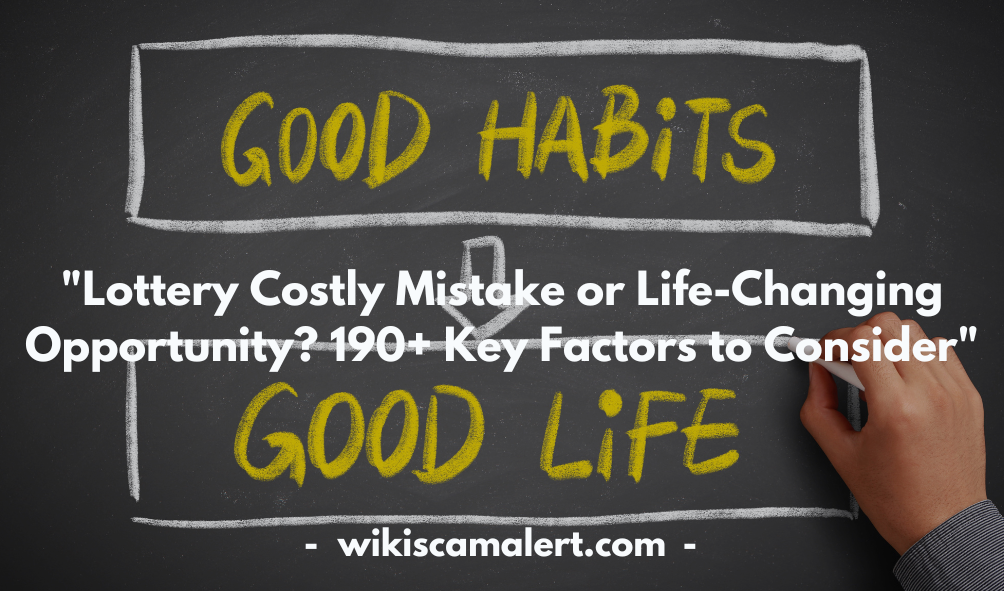The idea of winning millions from a small investment of a few dollars is incredibly tempting. Every week, countless hopefuls buy lottery tickets, dreaming of a life-changing windfall. Is Playing the Lottery a Costly Mistake or a Life-Changing Opportunity? In this article, we’ll dive deep into how the lottery works, the myths surrounding it, and whether it’s truly fair.

Is the Lottery a Scam Overview
- Debunking the Lottery Scam Myth – Is it truly rigged, or just a game of chance?
- How Legitimate Lotteries Operate – Understanding how national and state-run lotteries work.
- Why Some People Believe the Lottery is a Scam – Analyzing public skepticism.
- The Difference Between Legit Lotteries and Lottery Scams – Avoiding fraud while playing legally.
- Where Does Lottery Revenue Go? – The breakdown of ticket sales and prize payouts.
- Are Lottery Winnings Really Paid Out? – Exploring success stories and payout mechanisms.
- The Role of Randomness in Lottery Draws – How fairness is maintained in official lotteries.
- Biggest Lottery Fraud Cases in History – How some people exploited loopholes.
- Can Lotteries Be Manipulated? – A look at past controversies and security measures.
- Should You Play the Lottery or Avoid It? – Weighing the pros and cons for players.
Understanding Lottery Mechanics
- How Do Lottery Draws Work? – The process behind selecting winning numbers.
- Random Number Generators vs. Physical Draws – Comparing modern and traditional lottery methods.
- How Lottery Tickets Are Verified – Ensuring authenticity and preventing fraud.
- How Winnings Are Distributed – Lump sum vs. annuity payments explained.
- What Happens When No One Wins the Jackpot? – How rollovers and prize pools function.
- The Role of Lottery Commissions – Who regulates and oversees fair play?
- The Science of Number Picking – Do patterns or lucky numbers increase chances?
- Why Some Lotteries Have Better Odds Than Others – Understanding game variations.
- The Difference Between National and Local Lotteries – Payout sizes and regulations.
- How Second-Chance Lotteries Work – Unclaimed prizes and bonus opportunities.
History of Lottery and Its Evolution
- The Origins of Lotteries in Ancient Civilizations – Early forms of lottery-based gambling.
- Lotteries in Medieval Europe – How they were used for public funding.
- The Role of Lotteries in Funding Wars and Infrastructure – Historical case studies.
- Lotteries and Their Place in Early America – How the U.S. used lotteries for development.
- How the Modern Lottery Was Born – From simple draws to billion-dollar jackpots.
- The Rise of Online Lotteries – Digital evolution of lottery gambling.
- Notorious Lottery Scandals Throughout History – Fraud cases that changed regulations.
- Lottery Innovations Over Time – From scratch-offs to Powerball changes.
- How Lotteries Became Multi-State and International – The globalization of lottery play.
- Future of Lottery Gaming – What’s next for lottery formats and technologies?
Lottery Odds and Probability Explained
- What Are the Odds of Winning the Lottery? – Breaking down statistical chances.
- Why Are Lottery Odds So Low? – The math behind massive jackpot probabilities.
- How Different Lotteries Compare in Odds – Powerball vs. Mega Millions vs. local games.
- Can You Improve Your Chances of Winning? – Strategies and myths analyzed.
- Why Do Some People Win Multiple Times? – Exploring statistical anomalies.
- The Concept of Lottery Number Patterns – Do certain numbers appear more often?
- How Lottery Probability Differs from Casino Gambling – Comparing statistical chances.
- The Role of Lottery Pools and Syndicates – Do group plays increase odds?
- How Secondary Prizes Affect Overall Odds – Understanding non-jackpot winnings.
- The Reality of Beating Lottery Probability – Is there any real winning formula?
The Psychology Behind Playing the Lottery
- Why Do People Keep Playing Despite the Odds? – The hope and excitement factor.
- The Role of Dopamine in Lottery Addiction – How gambling triggers pleasure responses.
- The Illusion of Control in Lottery Games – Why players think they can predict numbers.
- Lottery and the “Near Miss” Effect – How almost-winning keeps players hooked.
- How Lottery Advertisements Influence Players – The power of marketing psychology.
- Why People Believe in “Lucky Numbers” – The superstitions behind picking numbers.
- The Psychological Impact of Winning the Lottery – Does it really bring happiness?
- Lottery Play as a Form of Escapism – Why some see it as a ticket to a better life.
- How Social Pressure Affects Lottery Play – Group participation and office pools.
- The “Gambler’s Fallacy” in Lottery Thinking – Why people believe past results affect future draws.
Biggest Lottery Scandals in History
- The Hot Lotto Fraud Case (Eddie Tipton Scandal) – Eddie Tipton, a former Multi-State Lottery Association (MUSL) employee, rigged lottery computers to pick numbers he could predict, stealing millions before being caught.
- The Pennsylvania Lottery Scandal (Triple Six Fix) – In 1980, a group rigged the Pennsylvania Lottery’s daily number draw by injecting all balls except the number “666” with heavy paint, ensuring it was drawn.
- The Massachusetts Lottery Agent Scam – Lottery agents helped store owners claim tickets for tax-avoidance schemes, turning in losing tickets as “winners” in exchange for a fee.
- The Nick Perry Scandal – A TV announcer conspired to rig the Pennsylvania Lottery by replacing certain balls with weighted ones, ensuring a predetermined outcome.
- The Chinese Lottery Scandal – Officials in China manipulated lottery numbers, siphoning off funds meant for public welfare into their own pockets.
- The UK National Lottery Fraud – A group attempted to claim a fraudulent £2.5 million prize using a fake ticket, almost succeeding before investigators exposed the scheme.
- The Ontario Lottery Retailer Scandal – Lottery retailers in Canada were accused of cheating customers by keeping winning tickets for themselves, leading to a massive investigation.
- The 2005 California Lottery Scam – A scammer tricked an elderly woman into handing over her winning ticket in exchange for a fake payout.
- The Florida Lottery Retailer Scam – Store clerks lied to customers about their ticket status, keeping winning tickets for themselves and cashing them later.
- The 2018 Indian Lottery Fraud – A massive operation uncovered officials tampering with paper lottery results, redirecting winnings to preselected individuals.
Is the Lottery Rigged? Myths vs. Facts
- Myth: The Government Controls the Winning Numbers – No concrete evidence supports claims that state or national governments manipulate lottery draws.
- Fact: Lottery Numbers Are Randomly Generated – Most lotteries use advanced random number generators (RNGs) to ensure fair and unpredictable outcomes.
- Myth: Certain Numbers Are More Likely to Win – No number is luckier than another; all have an equal chance in legitimate lotteries.
- Fact: Large Jackpots Can Be Harder to Win – The more players in a lottery, the lower the odds of winning, but this is due to mathematics, not rigging.
- Myth: The Lottery Is Designed to Ensure No One Wins Big – Though winning is rare, jackpots are regularly claimed, proving that the game functions as designed.
- Fact: Some Retailers Engage in Fraud – While the lottery itself is typically fair, some retailers have been caught scamming winners out of their prizes.
- Myth: The Lottery Always Favors the Rich – While wealthier people can afford more tickets, winners come from all backgrounds.
- Fact: Rigging Scandals Have Happened – Past lottery frauds have involved employees and store clerks, but these cases were exceptions, not the rule.
- Myth: Computer-Generated Picks Are Less Likely to Win – Quick-pick numbers win just as often as manually chosen numbers.
- Fact: Lotteries Are Heavily Regulated – Strict security measures are in place to prevent fraud, including audits and surveillance of the draw process.
Where Does Lottery Money Really Go?
- Prize Payouts (About 50-60%) – Most of the revenue generated from ticket sales goes toward paying winners.
- State Government Funds (30-40%) – A large portion of lottery revenue funds state programs like education, public safety, and infrastructure.
- Administrative Costs (5-10%) – A fraction of revenue covers the operational expenses of running the lottery, including advertising and staff salaries.
- Retailer Commissions (5-7%) – Lottery retailers earn a commission on ticket sales and receive bonuses for selling winning tickets.
- Unclaimed Winnings (Reinvested or Donated) – Some states use unclaimed lottery money for additional state-funded programs or second-chance drawings.
- Education and Scholarship Programs – Many lotteries contribute directly to education, funding scholarships and school programs.
- Public Works and Infrastructure – Some lottery funds support transportation, road repairs, and park development.
- Veterans and Social Services – Certain states allocate lottery funds to veterans’ assistance programs and social welfare initiatives.
- Scandals and Misuse of Funds – Some states have faced controversy over mismanagement of lottery proceeds, leading to calls for better transparency.
- Comparing States: Who Spends Lottery Money Best? – Some states, like Georgia, have clear, successful education funding from lottery revenue, while others face criticism for inefficiencies.
Lottery Scams and How to Avoid Them
- Fake Lottery Winnings Scams – Scammers contact victims, claiming they’ve won a lottery they never entered, then demand fees to “release” the winnings.
- Advance Fee Scams – Fraudsters ask for an upfront payment before sending alleged winnings, which never arrive.
- Phishing Lottery Scams – Scammers use fake emails or messages claiming to be from official lottery organizations, tricking victims into revealing personal details.
- Lottery Syndicate Scams – Fake syndicates promise shared winnings but instead steal members’ money.
- Bogus International Lotteries – Some scams claim victims have won foreign lotteries, requiring fees or taxes to claim the nonexistent prize.
- Fake Charity Lotteries – Scammers use the names of real charities to collect fraudulent donations disguised as lottery winnings.
- Phone Call Lottery Scams – Victims receive phone calls from fraudsters posing as lottery officials, instructing them to send money or provide banking details.
- Fake Social Media Giveaways – Scammers impersonate legitimate lottery brands, offering fake prizes to lure victims.
- How to Verify a Legitimate Lottery Win – Real lottery organizations never ask for upfront payments, and official winnings can be verified through state lottery websites.
- Best Practices to Stay Safe from Lottery Scams – Never share personal information, ignore unsolicited lottery notifications, and check official sources for legitimate winnings.
The Impact of the Lottery on Low-Income Players
- The Lottery as a “Hope Tax” – Many low-income individuals see the lottery as their best chance at financial freedom, despite the slim odds.
- Disproportionate Spending on Lottery Tickets – Studies show that lower-income players spend a higher percentage of their earnings on lottery tickets.
- Lottery Ads Targeting Vulnerable Communities – Some states market the lottery aggressively in low-income areas, raising ethical concerns.
- Gambling Addiction Risks – Financially struggling individuals may develop unhealthy lottery gambling habits in hopes of hitting the jackpot.
- Missed Opportunities for Real Wealth Growth – Money spent on lottery tickets could be invested in savings, education, or retirement accounts for better financial security.
- Financial Struggles of Lottery Winners – Many winners, especially from lower-income backgrounds, mismanage their wealth and end up worse off.
- Lottery Funds and Public Benefits – Some states fund programs that help low-income residents, but the people buying tickets may not directly benefit.
- Comparing Lottery Spending to Other Forms of Entertainment – While some argue the lottery is just entertainment, critics say its effects on poor communities are more damaging than other forms of leisure spending.
- Government Responsibility in Lottery Regulation – Should the government limit lottery marketing or implement better consumer protection policies?
- How to Encourage Smarter Financial Choices – Educating the public on better ways to grow wealth could help reduce reliance on lottery spending.
Lottery Winners: Success Stories vs. Tragic Downfalls
- The Rise and Fall of Jack Whittaker – From Millionaire to Bankruptcy
- How a Lottery Win Helped a Single Mother Build a Fortune
- Michael Carroll’s $15 Million Jackpot – A Rags-to-Riches-to-Rags Tale
- From Homeless to a Mansion: The Inspiring Story of Sharon Tirabassi
- The Curse of Winning: How Many Lottery Winners End Up Worse Off
- David Lee Edwards – A $27 Million Win That Ended in Tragedy
- The Smart Way to Spend Lottery Winnings – Stories of Success
- Andrew Jackson Whittaker – Why Too Much Money Can Be Dangerous
- How Some Winners Stay Wealthy While Others Lose It All
- The Psychological Toll of Winning: Are You Prepared for the Pressure?
Legal Regulations Governing Lotteries
- Understanding Lottery Laws: A Country-by-Country Comparison
- Are Lotteries Truly Legal? How Governments Control the System
- Lottery Taxation: How Much Do You Really Take Home?
- Why Some States Ban Lotteries While Others Promote Them
- The Role of the Government in Ensuring Fair Play
- How Anti-Money Laundering Laws Affect Lottery Winnings
- Can a Lottery Refuse to Pay You? Understanding the Fine Print
- The Truth About Lottery Anonymity: Can You Stay Private?
- International Lottery Laws: Can You Play Outside Your Country?
- Lottery Fraud: What Legal Actions Are Taken Against Scammers?
Lottery Strategies: Do They Really Work?
- The Myth of Lucky Numbers – Do They Really Increase Your Odds?
- Lottery Wheeling Systems Explained – A Smarter Way to Play?
- Should You Join a Lottery Pool? Pros and Cons
- Picking Random vs. Choosing Numbers: Which Works Better?
- Are Quick Picks More Likely to Win? The Truth Revealed
- The Probability Factor: Understanding Your True Odds of Winning
- How Lottery Algorithms Work and Whether You Can Beat Them
- The Psychology Behind Lottery Strategies – Does It Matter?
- Do Past Winning Numbers Influence Future Draws?
- Why Most Strategies Fail – The Reality of Lottery Luck
The Lottery as a Government Revenue Stream
- How Much Money Do Governments Make from the Lottery?
- Where Does Lottery Revenue Really Go? A Breakdown
- Funding Public Services: How the Lottery Supports Schools & Roads
- Lottery Money vs. Taxes: Which Generates More Revenue?
- The Ethics of Using Lottery Funds for Government Programs
- Why Some States Rely Heavily on Lottery Revenue
- Are Lotteries Just a Hidden Tax on the Poor?
- The Impact of Lottery Revenue on State Budgets
- How Lottery Revenue is Distributed Across Different Sectors
- Could Governments Survive Without Lottery Income?
Social and Economic Effects of Lottery Gambling
- Does Playing the Lottery Promote Gambling Addiction?
- The Lottery and Poverty: Who Spends the Most on Tickets?
- Why Low-Income Communities Buy More Lottery Tickets
- The Economic Impact of Lottery Winnings on Local Communities
- Is the Lottery a Form of Financial Hope or Exploitation?
- How Lottery Advertising Targets Vulnerable Players
- Does Winning the Lottery Improve Long-Term Happiness?
- The Effect of Lottery Wins on Family and Relationships
- Can the Lottery Actually Reduce Crime Rates?
- What Happens When a Small Town Has a Big Lottery Winner?
Comparing Lotteries vs. Other Forms of Gambling
- House Edge Differences – Lotteries have a significantly higher house edge compared to casino games like blackjack or poker.
- Skill vs. Pure Chance – Games like poker require skill, while the lottery is purely luck-based.
- Payout Structures – Lottery winnings are lump-sum or annuity-based, while casinos offer immediate payouts.
- Ticket Price vs. Betting Amounts – Lottery tickets are low-cost, whereas casino gambling involves higher stakes.
- Frequency of Play – Lotteries have scheduled draws, while casino games and sports betting are available 24/7.
- Jackpot Size Differences – Lotteries offer massive jackpots, while casino payouts vary based on game type.
- Addiction Risk – The instant nature of gambling in casinos and sports betting often leads to faster addiction.
- Social Stigma and Legality – Lotteries are widely accepted, while some forms of gambling are banned in certain regions.
- Odds of Winning – Lotteries have astronomical odds, while games like blackjack offer better winning chances.
- Psychological Appeal – Lotteries promise life-changing wealth, whereas other gambling options provide short-term excitement.
Digital Lotteries and Online Lottery Scams
- Rise of Online Lotteries – The digital age has made it easier for players to enter lotteries worldwide.
- Fake Lottery Websites – Scammers create websites that look like official lotteries to steal personal information.
- Email and SMS Lottery Scams – Fraudulent messages claiming the recipient has won a fake lottery.
- Upfront Payment Scams – Requests for “processing fees” before receiving fake winnings.
- Phishing and Identity Theft – Fraudsters use fake lottery entries to collect sensitive financial data.
- Unlicensed Lottery Operators – Some digital lottery platforms operate without proper licenses or regulation.
- Legit vs. Scam Lotteries – How to verify whether an online lottery is genuine or fraudulent.
- Crypto-Based Lottery Scams – The rise of blockchain lotteries and associated fraud risks.
- Social Media Lottery Scams – Fake giveaways and lottery promotions targeting unsuspecting users.
- How to Protect Yourself – Essential tips for avoiding digital lottery scams.
The Role of Media in Promoting Lottery Culture
- Lottery Advertisements – How commercials glamorize the idea of sudden wealth.
- News Coverage of Jackpot Winners – Media highlights only the winners, creating a false sense of possibility.
- Hollywood and the Lottery – How films and TV shows portray lotteries as the ultimate dream.
- Social Media Influence – Viral posts of lottery winners encourage ticket sales.
- Psychological Manipulation – How media uses hope and aspiration to drive lottery participation.
- Sponsorship and Endorsements – Lotteries partnering with sports teams, influencers, and celebrities.
- Underrepresentation of Losers – The media rarely reports on the millions who lose money playing the lottery.
- State-Run Promotions – How governments use advertising to boost lottery revenues.
- Lottery Winners’ Stories vs. Reality – The difference between media portrayals and the actual experiences of winners.
- The Impact on Gambling Culture – How lottery media coverage contributes to a wider gambling acceptance.
How to Play the Lottery Responsibly
- Set a Budget – Never spend money on the lottery that you can’t afford to lose.
- Understand the Odds – Knowing your chances of winning helps prevent unrealistic expectations.
- Avoid Chasing Losses – Playing repeatedly to “win back” losses can lead to financial trouble.
- Play for Entertainment, Not Income – Treat the lottery as a fun activity, not a financial plan.
- Join a Lottery Pool – Reducing individual costs while increasing chances of winning.
- Recognize the Signs of Gambling Addiction – Knowing when lottery play becomes problematic.
- Stick to Legal and Reputable Lotteries – Avoid scams and unauthorized lottery operators.
- Don’t Fall for “Guaranteed Win” Strategies – No system can guarantee a lottery win.
- Use Auto-Debit Restrictions – Prevent overspending by disabling automatic lottery purchases.
- Balance Lottery Play with Other Financial Goals – Prioritize savings and investments over lottery spending.
Alternatives to Playing the Lottery for Financial Success
- Investing in Stocks – Long-term stock market growth offers better returns than the lottery.
- Starting a Side Hustle – Generating additional income through freelancing or online businesses.
- Real Estate Investment – Buying rental properties or flipping houses for profit.
- High-Interest Savings Accounts – Building wealth steadily with safe, interest-generating accounts.
- Index Funds and ETFs – A passive investment strategy with proven long-term gains.
- Developing a Passive Income Stream – Blogging, YouTube, or digital products that generate recurring revenue.
- Entrepreneurship – Building your own business instead of gambling on luck.
- Learning a High-Paying Skill – Upskilling in technology, finance, or healthcare for higher earnings.
- Crowdfunding and Peer-to-Peer Lending – Alternative financial avenues with higher returns.
- Smart Budgeting and Saving Strategies – Managing finances effectively instead of relying on luck.
How to Play the Lottery Responsibly
If you choose to play, set strict spending limits and treat it as entertainment rather than a financial strategy.
How to Break Into a Safe in GTA Online: The Gaming Lottery
GTA Online incorporates gambling-like mechanics, mirroring real-world lotteries with random rewards that entice players into spending more.
Conclusion
So, is the lottery a scam? While it isn’t technically fraudulent, the odds are so stacked against players that it functions more as entertainment than a legitimate financial opportunity. Playing responsibly is key—never spend money you can’t afford to lose. For tips on how to protect yourself online and avoid scams, check out this cybersecurity guide.
FAQs
Can you really win big in the lottery?
Yes, but the odds are extremely low. Most players never win significant amounts.
What are the biggest lottery scams?
Fake lottery emails, phone calls demanding fees, and rigged draws.
How can I tell if a lottery is legit?
Government-run lotteries are legal. Any lottery asking for upfront fees is a scam.
What should I do if I win the lottery?
Hire a financial advisor, stay anonymous if possible, and create a financial plan.
Is playing the lottery worth it?
If played for fun, maybe. As an investment strategy? Absolutely not.










